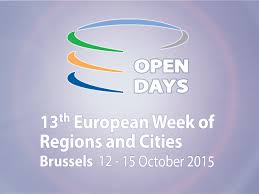EU Events
Follow Attend Connect

OPENDAYS 2015

Venue: Committee of the Regions | City: Brussels
In 2015, a total of about 400 Cohesion Policy programmes and more than 100 programmes financed in the field of rural development and fisheries policy, worth about EUR 500 billion, will be decided and running.
The reformed cohesion policy will make available up to EUR 351,8 billion to invest in Europe's regions, cities and the real economy. It will be the EU's principle investment tool for delivering the Europe 2020 goals: creating growth and jobs, tackling climate change and energy dependence, reducing poverty and social exclusion. This will be helped through targeting the European Regional Development Fund at key priorities such as support for small and medium-sized enterprises where the objective is to double support from EUR 70 to 140 billion over the 7 years.
Thematic concentration, increased efficiency, result-orientation and a stronger link to economic governance and the European Semester process will guide these new programmes, which will be financed by the European Structural and Investment Funds in the period until 2020.
The OPEN DAYS 2015 will be a perfect forum for national and regional managing authorities, final beneficiaries and EU institutions to exchange information and facilitate networking on novel approaches for implementing the funds.
Themes
With the headline of 'Europe's regions and cities: partners for investment and growth' 2015 will be structured around three thematic priorities:
- 'Modernising Europe': The regions in the energy Union and the single digital market
- 'Regions open for business': SME development, innovation and job creation
- 'Places and spaces': Urban and rural development; urban-rural integration
Under the three sub-themes, participants are invited to address challenges and solutions related to management and implementation issues as well as the cross-border, inter-regional or transnational dimension.
1) Modernising Europe: The regions in the Energy Union and the Single Digital Market
Policies to promote the European Energy Union and the Single Digital Market offer important new opportunities for growth and jobs. The new EU regional and urban policy programmes can make a significant contribution to policy implementation in both cases. Drawing on past experience, this sub-theme presents an opportunity to discuss how the new programmes and projects can help to make the EU the world number one in renewable energy and energy efficiency and create a vibrant knowledge-based society.
2) Regions open for business: SME development, innovation and job creation
Some 99% of businesses in Europe are SMEs. They provide two out of three jobs in the private sector and contribute to more than half of the total value added generated by EU businesses. The new EU programmes (2014-2020) can draw on considerable experience in SME promotion in the regions. This sub-theme provides an opportunity for an exchange of experience in this field covering the best practices in the conception and implementation of SME aid schemes and how to foster innovative capacity in SMEs, including links to Smart Specialisation Strategies and how regions can develop more micro enterprises.
3) Places and spaces: Urban and rural development, urban-rural integration
EU actions in the urban areas have played a key role in using the potential in cities for innovation and new economic activities, addressing acute problems of social cohesion often arising in deprived urban areas and promoting greater balance in the national and European urban network. This sub-theme will focus on how EU regional and urban programmes can promote more balanced territorial development, how to promote rural competitiveness and reduce the rural-urban drift of population. The special challenge of border cities and border rural hinterlands will be addressed under this theme.
REGISTRATION IS NOW OPEN!
Powered by iCagenda